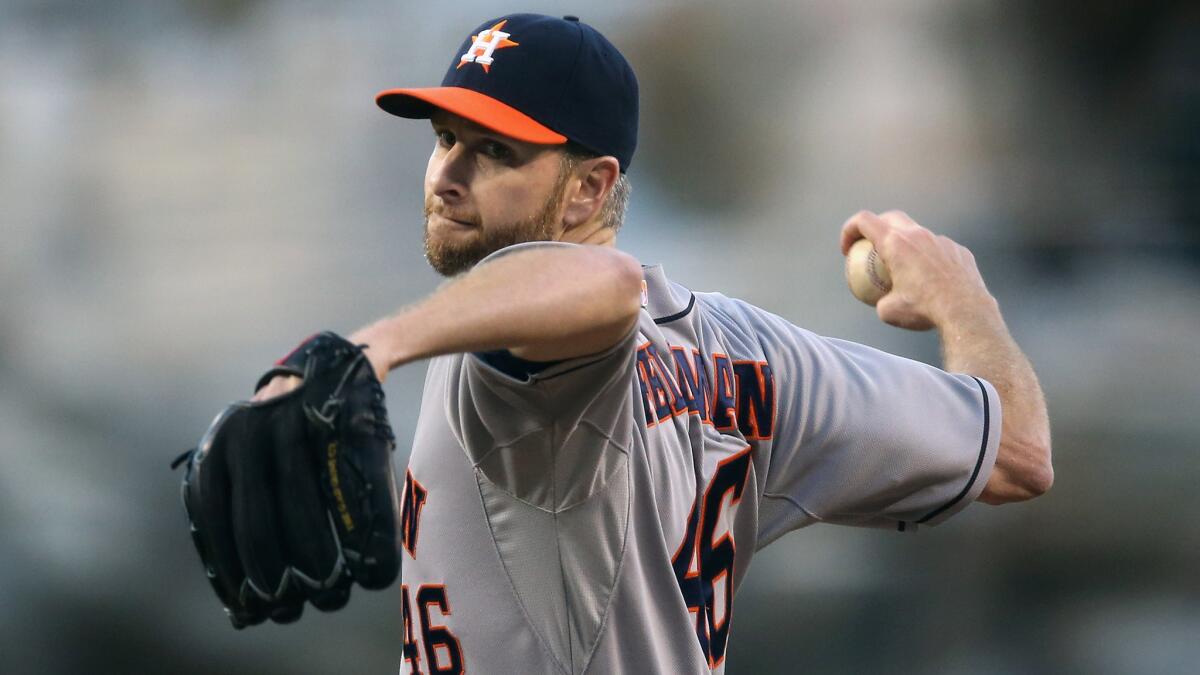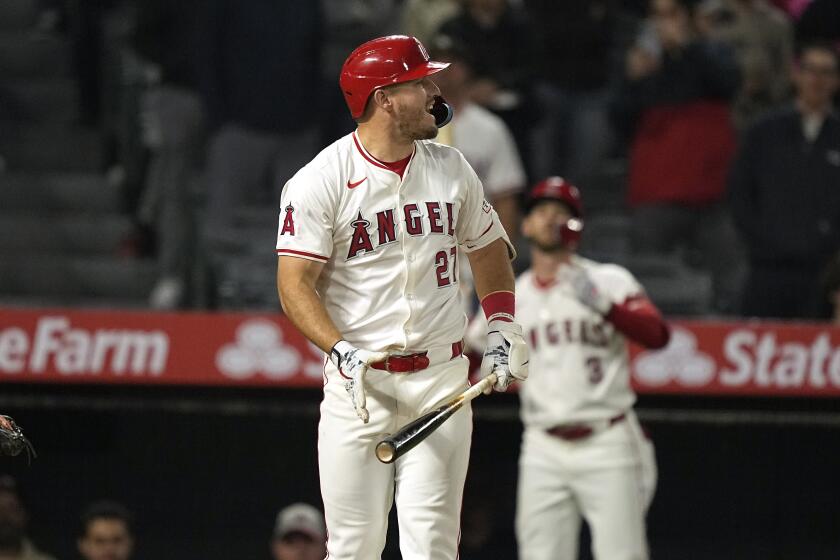Time is on Angels’ side in 9-3 victory over Astros

Houston ace Scott Feldman, who started against the Angels on Tuesday night, has a reputation as one of baseball’s most deliberate-working pitchers, the right-hander’s 24.1-second average time between pitches the 16th-slowest in baseball, according to Fangraphs.
The Angels got bogged down in Minute Maid Park on April 6, when Feldman slow-played his way through a seven-inning, one-run, three-hit effort, often violating a rule that requires a pitcher, when the bases are empty, to deliver his next pitch within 12 seconds of receiving the ball from the catcher.
It’s a tactic pitchers sometimes use to throw off the timing of hitters, much like a batter will step out of the box to throw off the rhythm of a quick-working pitcher. Umpires rarely enforce the rule, but if it was a football game, Feldman would have been flagged for a few delay-of-game penalties.
For at least one Angel, though, Feldman’s style is preferable to a pitcher who approaches the game as if it was a two-minute drill.
“I’d rather have that than to get Buehrle’d,” catcher Hank Conger said, laughing at his ability to turn the last name of baseball’s fastest-working pitcher, Toronto left-hander Mark Buehrle (16.1 seconds between pitches), into a verb.
“It’s tough as hitters because we can’t really dictate the pace of play. As catchers, we like to have our pitchers work fast because it helps the fielders behind them.”
Angels hitting coach Dave Hansen said the biggest challenge when facing a pitcher like Feldman, who entered Tuesday with a 2-1 record and 2.63 earned-run average, is to not allow his pace to frustrate you.
“We have to make adjustments to tempo all the time, and a pitcher working extremely slow is one of them,” Hansen said. “You can start thinking too much. We need to be able to react. It’s important to control our emotions at the plate. That’s the cat-and-mouse game.”
There is no 12-second rule when runners are on base, so hitters have to be extra patient in those situations.
“With guys on base, he has every right to take as much time as he wants, and there’s nothing we can do about it,” Angels Manager Mike Scioscia said. “At some point, he’s got to make a pitch, and at some point, if he makes a mistake, we have to square it up and hit it hard.”
The Angels did just that Tuesday night, roughing up Feldman for eight runs — though five were unearned — and nine hits in four innings of a 9-3 victory in Angel Stadium, only their second win in their last 10 home games against the lowly Astros.
Third baseman David Freese, who was activated Tuesday afternoon after missing 16 games because of a small fracture on the middle finger of his right hand, drove in four runs with a two-run single to center in the first, a ground ball in the fifth and a double off the right-field wall in the sixth.
Mike Trout, who started at designated hitter, drove in three runs with a second-inning sacrifice fly and RBI singles in the fourth and fifth but was pulled for a pinch-runner in the fifth becuase of tightness in one of his legs. Scioscia would not elaborate on his condition.
In Angels starter Tyler Skaggs, who allowed one unearned run in eight innings of a 5-1 win over the Astros on April 5, Feldman met his match. The 22-year-old left-hander is actually every bit as deliberate as Feldman, having entered Tuesday with a 25.2-second average time between pitches, the sixth-slowest in baseball.
But unlike Feldman, Skaggs didn’t make many mistakes while allowing one run and five hits in seven innings Tuesday night, striking out six and walking one to improve to 4-1 and lower his ERA from 4.53 to 4.14.
More to Read
Go beyond the scoreboard
Get the latest on L.A.'s teams in the daily Sports Report newsletter.
You may occasionally receive promotional content from the Los Angeles Times.







